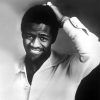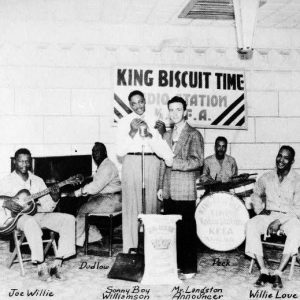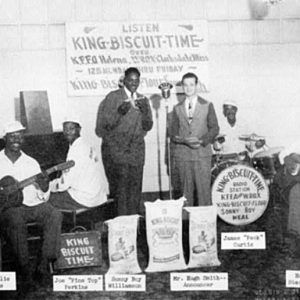calsfoundation@cals.org
"Sonny Boy" Williamson II (1912?–1965)
aka: Aleck Miller
Sonny Boy Williamson first became famous as a blues harmonica player in 1941 on the groundbreaking King Biscuit Time radio program (often credited as the first regularly scheduled blues radio show) broadcast by station KFFA in Helena (Phillips County). Williamson’s fame spread, particularly through Europe, in the 1960s and has continued to grow since his death. The annual King Biscuit Blues Festival in Helena-West Helena still features his music.
Williamson went to great lengths to mislead would-be biographers, and facts about his life are difficult to verify. His real name was Aleck Miller; he was apparently sometimes called Rice, and he was most likely born in 1912 in Glendora, Mississippi, to Millie Ford. He took his stepfather Jim Miller’s surname. As a very young child, he taught himself to play harmonica; by the age of six or seven, he was performing at church events and local parties, apparently billing himself at the latter as Reverend Blue.
For more than three decades, he was an itinerant musician, working as a solo act and in association with a host of other now-famous bluesmen, especially Sunnyland Slim, Elmore James, Robert Johnson, Howlin’ Wolf, and Robert Lockwood Jr. He traveled throughout the South, working carnivals and lumber camps as well as juke joints and street corners in Mississippi, Arkansas, and Tennessee. He probably played in New Orleans, Louisiana, in the 1920s and almost certainly appeared on the radio in southern Illinois in the late 1930s, but his claim to a 1930s appearance on the Grand Ole Opry in Nashville, Tennessee, has never been verified and is almost certainly apocryphal. During this period, he was known both as Willie Miller and as Willie Williamson, among other names and nicknames.
In November 1941, Williamson began playing with Robert Lockwood Jr. on King Biscuit Time, where he starred on and off for more than twenty years. It was on this show, apparently, that he first unveiled his “Sonny Boy Williamson” moniker, initiating enormous confusion among blues scholars since another Sonny Boy Williamson, a harmonica player from Tennessee named John Lee Williamson, had already established himself in Chicago, Illinois. Williamson soon became King Biscuit Time’s most famous performer. The sponsor, the Interstate Grocery Company, was soon marketing Sonny Boy Corn Meal, with the harmonica-wielding blues musician displayed on every bag.
Despite these successes, Williamson did not record until 1951, when Lillian McMurry’s newly established Trumpet label in Jackson, Mississippi, issued “Eyesight to the Blind,” “Mighty Long Time,” “Nine Below Zero,” and “Mr. Down Child,” among others. These first recordings, long since recognized as classics of the genre, show him at the very top of his form—a laconic, often mordant and sarcastic vocalist, as well as a masterful instrumentalist.
In 1954, the Chess label in Chicago purchased Williamson’s contract, and he soon moved north, playing club dates in cities such as Detroit, St. Louis, Milwaukee, and Philadelphia. His several hits in the late 1950s and early 1960s (“Fattening Frogs for Snakes,” “Don’t Start Me to Talkin’,” “Your Funeral and My Trial,” “One Way Out,” and “99”) were followed by successful European tours in 1963 and 1964. The name game continued; on his passport, he was “Sonny Boy Williams,” and he was often billed in Europe as Sonny Boy Williamson II.
He greatly enjoyed the appreciation of European blues fans, touring in Denmark, Germany, and Poland and performing in several concerts with the Animals and the Yardbirds. He seriously considered settling permanently in England, but he returned instead to Helena, where he again appeared on the King Biscuit show.
On May 25, 1965, he was found dead by drummer James “Peck” Curtis after Williamson had failed to arrive at the station for a performance. He is buried in Tutwiler, Mississippi, where the birth date on his tombstone is almost certainly incorrect and the death date wrong beyond any doubt. Several names are listed, but Aleck Miller is given precedence.
In 2008, he was inducted into the Arkansas Entertainers Hall of Fame. In October 2014, he was honored with a marker on the Mississippi Blues Trail.
For additional information:
Donoghue, William E. ’Fessor Mojo’s “Don’t Start Me to Talkin’.” Seattle: Elliott & James, 1997.
Hay, Fred J. “The Sacred/Profane Dialectic in Delta Blues: The Life and Lyrics of Sonny Boy Williamson.” Phylon 48 (Winter 1988): 317–326.
Oliver, Paul. Liner notes for Sonny Boy Williams on King Biscuit Time. Arhoolie, 1993.
Palmer, Robert. Deep Blues. New York: Viking Press, 1981.
“Sonny Boy Williamson.” Mississippi Blues Trail. http://www.msbluestrail.org/blues-trail-markers/sonny-boy-williamson (accessed July 26, 2023).
Thomas, Lorenzo. “For Bluesman Sonny Boy Williamson, Pass the Biscuits One More Time.” Arkansas Times, June 1979, 24–31.
Robert Cochran
University of Arkansas, Fayetteville
This entry, originally published in Arkansas Biography: A Collection of Notable Lives, appears in the CALS Encyclopedia of Arkansas in an altered form. Arkansas Biography is available from the University of Arkansas Press.
 Music and Musicians
Music and Musicians World War II through the Faubus Era, 1941 through 1967
World War II through the Faubus Era, 1941 through 1967 "Fattening Frogs for Snakes," Performed by "Sonny Boy" Williamson
"Fattening Frogs for Snakes," Performed by "Sonny Boy" Williamson  King Biscuit Time
King Biscuit Time  King Biscuit Time
King Biscuit Time 



Comments
No comments on this entry yet.